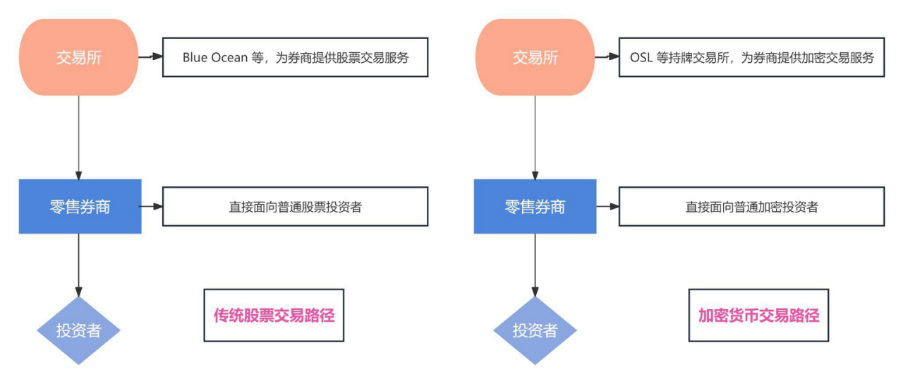摘要:市场剧烈波动之际,对券商来说,相比单纯的低成本,交易系统的稳定性才是王道。
本月初,在美国非农与失业率数据、战争风险等系列因素作用下,日韩股市相继触发熔断,数家美股券商也罕见发布公告,称「由于美股夜盘上游系统异常,夜盘时段暂停交易」。
在市场剧烈波动的极端行情时刻关闭交易窗口,使普通投资者只能眼睁睁看着资产大幅缩水,这一切的罪魁祸首,正是为多家头部券商提供服务的美股夜盘交易系统服务商 Blue Ocean。
值得注意的是,这一波受影响的港美股券商中,也有多家已相继宣布提供加密交易服务,本质上,它们的加密交易和美股交易在交易结构上存在一定的联系性,那它们的加密交易是怎样的一个流程,又能否避免类似美股交易的「拔网线」时刻?
Blue Ocean:交易流程中的上游角色
要厘清多家美股券商「拔网线」的真实缘由,我们需要先简单了解下 Blue Ocean 以及它和券商之间的关系。
作为一家主打美股夜盘交易的系统服务商,Blue Ocean 与多家券商建立了合作伙伴关系,致力于通过其自动化交易系统(ATS)为投资者提供在非传统交易时间(如亚洲市场营业时间等)交易美国全国市场系统(NMS)股票的服务。
具体来说,Blue Ocean 主要负责提供隔夜股票和 ETF 交易,从而使得各券商旗下的客戶能够在北京时间上午 10:00 至下午 6:00 进行交易,尽量做到全天候美股交易服务。简言之,Blue Ocean 在美股交易流程中处于上游角色,可以理解为一个专注于特定时段(主要是传统交易所以外的夜间时段等)的金融交易服务机构。
而在上周,就正是由于交易活动激增,Blue Ocean 短暂关闭了两个多小时,取消了一小部分交易,从而导致处于下游的多个美股券商受此影响,不得不发布公告称夜盘时段暂停交易,给众多投资者带来了极大损失。
有几家美股券商本身也受牵连——在选择上游交易提供服务商时,不能仅仅着眼于交易成本,更需着重考量其技术实力和应对突发风险的能力。
要知道,在瞬息万变的金融市场中,每一分钟的交易机会都至关重要,尤其是在市场剧烈波动的时期,短暂的交易中断都可能导致投资者的策略无法及时实施,从而影响投资收益。
持牌交易所:加密交易背后的核心基建
在这批受影响的港美股券商之中,有多家近期已宣布正式向投资者提供加密交易服务,而它们的加密交易流程,和美股交易在交易结构上存在一定的关联:
要知道,根据监管要求,只有持牌交易所才能向香港投资者提供加密货币交易服务,而目前香港证监会正式批准的持牌数字资产交易平台仅有两家——作为其中一家的OSL,其母公司更在香港主板上市。
这意味着,上述已提供加密交易服务的券商,实际上背后其实都是与 OSL 等持牌交易所达成合作,从而使得客户通过综合账户交易已上架的加密货币。
据了解,具体的交易流程通常是券商在 OSL 等持牌交易所开立一个 Omnibus Account(综合账户),随后依照每个客户的交易指令,为其在持牌交易所进行虚拟资产的交易,且交易币种也是获得证监会批准上架的虚拟资产或加密货币,包括比特币及以太币。
一言以蔽之,加密交易流程中的 OSL 等持牌交易所,恰似美股交易流程中的 Blue Ocean,相较于券商而言,均处于上游角色:
- 券商离散户尤其是传统投资者更近,投资者通过惯用的一个券商 APP 就能实现股票、债券、期货、期权、基金、虚拟资产等标的的一站式交易服务,带来了极大的便利;
- 但后端的加密货币托管、交易撮合、结清算还是在 OSL 等持牌合规所,凭借严格的安全措施和专业的技术团队,保障投资者的加密资产安全;

这种分工合作的模式,既充分发挥了券商在客户服务和市场推广方面的优势,又依靠持牌机构在合规、技术和风险控制方面的专长,共同构建了一个相对完整和安全的加密交易生态。
但同时也意味着,整个交易流程的顺畅运行依赖于券商与持牌机构之间的紧密协作和高效沟通。任何一方出现问题或延误,都可能影响到投资者的交易体验和资产安全。
相比于美股,加密货币本身就是 7×24 小时不间断交易,且市场波动幅度和极端行情出现频率都要远高于美股市场——相信不少朋友在急涨急跌时,都曾经有过卡顿乃至于「拔网线」的糟糕体验,几乎没有反应的机会,只能眼睁睁看着错失调仓而仓位大幅亏损。
因此能否在资产安全的前提下,保证加密交易足够的丝滑流畅,就显得十分重要。那目前在这样的交易结构下,当市场出现极端波动时,OSL 等持牌交易所又该如何避免类似美股交易「拔网线」的情况呢?
投资,好产品的重要衡量维度
其实,从商业角度考虑,投资跟成本,也是衡量产品的一个重要维度。
要知道,一套好的交易系统,必然需要投入大量的时间、金钱、人力等资源,这是谁都无法跳过的客观规律,短时间内以低价和蝇头小利吸引用户,必然难以长久维持。
毕竟对加密交易来说,牵涉到的是一个庞大的系统:不仅是在交易技术研发、交易系统维护方面,更在于整个合规架构的搭建,包括牌照申请与营运、资产托管、资金安全、会计审计等,这些都需要持续的投入,以及时处理可能出现的故障和漏洞,确保系统的不间断稳定运行。
以 OSL 为例,除了投入了巨额资金用于研发先进的交易技术,确保在高并发的交易环境下依然能够迅速、准确地处理每一笔交易外,据内部人士披露,其在合规安全架构上的付出更是堪称巨大,其中大部分是用于投资者保障,包括私钥管理、冷钱包维护等,同时作为持牌交易所 OSL 还需为客户的托管资产购买第三方保险。
而在上币审核方面,OSL 也会对项目团队、流动性、技术安全、受监管情况进行尽职调查,以杜绝出现 Plus Token 等诈骗项目,此外 OSL 交易所母公司为港交所主板上市企业,除了证监会的要求外,还由四大会计师事务所之一进行审计。
这其中的每一项,都是巨大的投入和成本支出,这种全方位的安全保障和合规性、专业度,也是比价格更重要的长线竞争优势。
因此从这个角度看,低价和宽松的规则从来不是捷径,即便这种策略或许能在短期内获得一定的用户量,但由于在系统建设、安全保障、合规运营等关键方面投入不足,长远看往往得不偿失,很容易出现系统故障、数据泄露等严重问题。
而 7×24 小时不间断交易的加密交易市场中,每一分钟的交易机会都至关重要,每一次系统崩溃的「拔网线」时刻,都会在给投资者带来损失的同时,削弱市场对加密交易的信任与热情,甚至于让行业陷入信任危机,难以持续发展。
小结
安全保障与系统稳定性,是加密交易的生命线。
尤其是对 7×24 小时不间断交易、日益膨胀的加密交易需求,每一次「拔网线」故障的背后,都可能会有一批用户停止加密交易,因此对于提供加密货币交易的券商来说,用户无疑会格外关注市场剧烈波动的可能性下交易所能否提供足够的稳定性与安全保障。
大家对合规安全、交易稳定性的需求是刚性的,无论市场是否做好了准备,这个拐点最终都会如期而至。
免责声明:本文章仅代表作者个人观点,不代表本平台的立场和观点。本文章仅供信息分享,不构成对任何人的任何投资建议。用户与作者之间的任何争议,与本平台无关。如网页中刊载的文章或图片涉及侵权,请提供相关的权利证明和身份证明发送邮件到support@aicoin.com,本平台相关工作人员将会进行核查。




